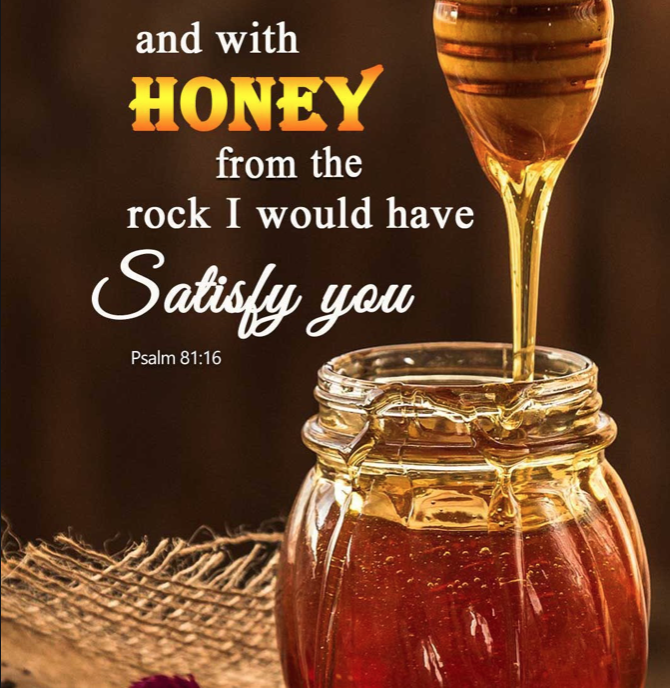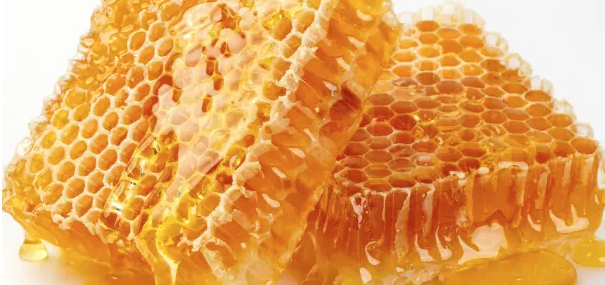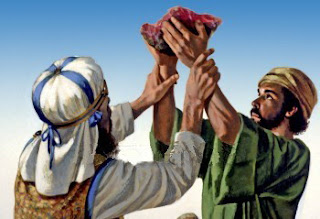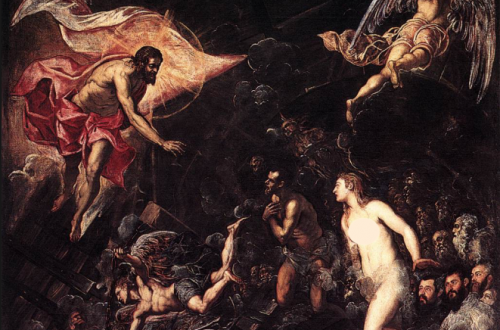
Honey
What is sweeter than honey? (Judges 14:18 NET partial)

Honey is a syrupy food produced by bees from plant nectar, a kind of sweet sap secreted by flowers. Honey is easily assimilated in the human body because it has been predigested: bees temporarily store the nectar in a special part of their stomachs, where it is partially digested. The bees’ digestive fluids contain enzymes that transform the nectar into honey. Bees later regurgitate the honey into the cells of their honeycomb, where the honey dries and thickens. To produce about 1 pound (0.5 kilogram) of honey requires 25,000 trips between the hive and flowers. A pound of honey contains the essence of about 2 million flowers. (3)
The color and flavor of the honey are determined by the flowers from which the nectar is taken. For example, honey made from alfalfa is amber with a distinctive, minty flavor, whereas honey from buckwheat is the color of molasses and strongly flavored. In the United States most commercial honey comes from clover, buckwheat, alfalfa, orange, and cotton. (3)
Honey is most often served in its natural state, like jam or jelly. It is also widely used in baked goods and candies. It is generally marketed in one of three forms. Comb honey is honey in the comb as it is stored by the bees. Chunk honey is bottled with small chunks of the comb. Extracted honey is liquid honey that has been removed from the comb by centrifuge. (3)
It is not good to eat too much honey, nor is it honorable for people to seek their own glory. (Proverbs 25:27 NET
When you find honey, eat only what is sufficient for you, lest you become stuffed with it and vomit it up. (Proverbs 25:16 NET)
Raw honey is a potential source of botulism spores, according to the National Institutes of Health. Symptoms of food poisoning from botulism include stomach cramps, diarrhea, nausea, vomiting, and fever. In adults, these symptoms are generally more uncomfortable than dangerous but can become life-threatening if left untreated. In babies whose immune systems are still weak, botulism is severe, and you should call a doctor immediately. The NIH recommends that babies under one year old never be given honey and that people of all ages should eat pasteurized honey to be safe from food poisoning. (7)
In ancient times, honey was called the nectar of the gods and was mankind’s, principal sweetener. Honey consists almost entirely of sugars, but it also contains a number of minerals, B-complex vitamins, and amino acids. (3)
Honey has a flashpoint of around 93 degrees Celsius (199.4 degrees Fahrenheit) which means that honey is readily combustible. If honey is crystalized, it should melt at around 40-50 degrees Celsius (104-122 degrees Fahrenheit). The exact temperature will depend on the composition of the honey. The boiling temperature of honey is around 100 degrees Celsius (approximately 212 degrees Fahrenheit, roughly the boiling point of water). (5)
Honey should not be heated rapidly, over direct heat. Basically, the hotter you heat it, the more potential for reducing nutritional value. Excessive heat can have detrimental effects on the nutritional value of honey. Heating up to 37°C (98.6 F) causes loss of nearly 200 components, part of which are antibacterial. Heating up to 40°C (104 F) destroys invertase, an important enzyme. Heating up to 50°C (122 F) for more than 48 hrs. turns the honey into caramel (the most valuable honey sugars become analogous to sugar). Heating honey higher than 140 degrees F for more than 2 hours will cause rapid degradation. Heating honey higher than 160 degrees F for any time period will cause rapid degradation and caramelization. Generally, any larger temperature fluctuation (10°C is ideal for the preservation of ripe honey) causes decay. (8)
In Old Testament times, honey appeared in two forms: honey deposited from wild bees (Deuteronomy 32:13. Psalms 81:16) and a syrup made from dates and grape juice (2 Kings 18:32). Almost all references to honey in the Old Testament are to wild honey. Bees made their honeycombs and deposited their honey in holes in the ground (1 Samuel 14:25), under rocks or in crevices between rocks (Deuteronomy 32:13), or in the carcasses of animals (Judges 14:8). (2)
Beekeeping is not mentioned specifically in the Old Testament; however, honey from domesticated bees may have been referenced as one of the products “of the field” (2 Chronicles 31:5). In later times beekeeping was practiced by the Jews. The hives were of straw and wicker. Before removing the combs, the beekeeper stupefied the bees with fumes of charcoal and cow dung burnt in front of the hives. (2)
Honey was served as a foodstuff (Genesis 43:11) and as an item of trade (Ezekiel 27:17). Honey was rare enough to be considered a luxury item (Genesis 43:11. 1 Kings 14:3). However, honey was so plentiful in Canaan that the land there was described as a land “flowing with milk and honey” (Exodus 3:8; Exodus 3:17; Exodus 13:5; Exodus 33:3; Leviticus. 20:24; Numbers 13:27; Numbers 14:8; Numbers 16:14; Deuteronomy 6:3; Deuteronomy 11:9; Deuteronomy 26:9; Deuteronomy 26:15; Deuteronomy 27:3; Deuteronomy 31:20; Joshua 5:6; Jeremiah 11:5; Jeremiah 32:22; Ezekiel 20:6; Ezekiel 20:15) and a land of olive trees and honey (Deuteronomy 8:8; 2 Kings. 18:32). (2)(4) That would imply a land plentiful in grazing pastures and flowers!
In New Testament times, honey was also viewed as a food eaten by those who lived in the wilderness (Matthew 3:4; Mark 1:6). (2)
Typological Meaning of Honey and Offerings

“ ‘No grain offering which you present to the Lord can be made with yeast, for you must not offer up in smoke any yeast or honey as a gift to the Lord. (Leviticus 2:11 NET)
It is believed that honey was forbidden in offerings made by fire (1) because it ferments under certain conditions. For this reason, honey is associated with corruption. (XV) Jesus committed no sin, had no sin within Himself, and never knew sin; therefore, He qualified to be our sacrificial offering. Jesus was without corruption; therefore, corruptable honey was forbidden from the fire offerings that typologically represented Jesus’ ultimate sacrifice on the cross. (1)
You know that from your empty way of life inherited from your ancestors you were ransomed—not by perishable things like silver or gold, but by precious blood like that of an unblemished and spotless lamb, namely Christ. (1 Peter 1:18,19 NET)
He committed no sin nor was deceit found in his mouth. (1 Peter 2:22 NET)
And you know that Jesus was revealed to take away sins, and in him there is no sin. (1 John 3:5 NET)
God made the one who did not know sin to be sin for us, so that in him we would become the righteousness of God. (2 Corinthians 5:21)
Again, honey was forbidden from fire offerings because they were supposed to provide a soothing “incorruptible” aroma to the Lord.
You can present them to the Lord as an offering of first fruit, but they must not go up to the altar for a soothing aroma. (Leviticus 2:12 NET)
However, honey was one of the seven fruits of the land permitted in Firstfruits offerings given to the priests for their services during the Feast of Weeks (Pentecost), which means they were not offered by fire. (9)
So you must keep his commandments, live according to his standards, and revere him. For the Lord your God is bringing you to a good land, a land of brooks, springs, and fountains flowing forth in valleys and hills, a land of wheat, barley, vines, fig trees, and pomegranates, of olive trees and honey, (So you must keep his commandments, live according to his standards, and revere him. For the Lord your God is bringing you to a good land, a land of brooks, springs, and fountains flowing forth in valleys and hills, a land of wheat, barley, vines, fig trees, and pomegranates, of olive trees and honey, (Deuteronomy 8:6–8 NET)
“All the best of the olive oil and all the best of the wine and of the wheat, the first fruits of these things that they give to the Lord, I have given to you. And whatever first ripe fruit in their land they bring to the Lord will be yours; everyone who is ceremonially clean in your household may eat of it. (Numbers 18:12,13 NET)
Typological Meaning of Honey and God’s Word
The Word of God is compared to honey and provides the following scriptural benefits:
Your words are sweeter in my mouth than honey! (Psalm 119:103 NET)
Pleasant words are like a honeycomb, sweet to the soul and healing to the bones. (Proverbs 16:24 NET)
The commands to fear the Lord are right and endure forever. The judgments given by the Lord are trustworthy and absolutely just. They are of greater value than gold, than even a great amount of pure gold; they bring greater delight than honey, than even the sweetest honey from a honeycomb. (Psalm 19:9,10 NET)
Eat honey, my child, for it is good, and honey from the honeycomb is sweet to your taste. Likewise, know that wisdom is sweet to your soul; if you find it, you will have a future, and your hope will not be cut off. (Proverbs 24:13,14 NET)
As your words came to me I drank them in, and they filled my heart with joy and happiness because I belong to you. (Jeremiah 15:16 NET)
If we satisfy our hungry minds and hearts with the things of the world (that are bitter compared to the Word of God), then we will not desire the honey-sweet Word of God. Furthermore, if we have never tasted the honey-sweet Word of God, then we will think the bitter things the world offers are sweet.
The one whose appetite is satisfied loathes honey, but to the hungry mouth every bitter thing is sweet. (Proverbs 27:7 NET)
But he would feed you with the finest of the wheat, and with honey from the rock I would satisfy you.” (Psalm 81:16 NET)
Typological Meaning of the Rock from which comes the Honey (i.e., the Word of God)
When Jesus came to the area of Caesarea Philippi, he asked his disciples, “Who do people say that the Son of Man is?” They answered, “Some say John the Baptist, others Elijah, and others Jeremiah or one of the prophets.” He said to them, “But who do you say that I am?” Simon Peter answered, “You are the Christ, the Son of the living God.” And Jesus answered him, “You are blessed, Simon son of Jonah, because flesh and blood did not reveal this to you, but my Father in heaven! And I tell you that you are Peter, and on this rock I will build my church, and the gates of Hades will not overpower it. (Matthew 16:13–18 NET)
Some people think the Church is built upon Simon Peter, because Jesus calls Simon Peter a rock. But Jesus calls Simon Peter a small rock, a boulder [petros, masculine in gender, a detached but large fragment of rock] (11). But then Jesus is making a play on words. He uses another word for rock which means, a “rock ledge,” a “stratum of rock,” “bedrock,” or a “stone mountain,” [petra, feminine in gender, a feminine demonstrative pronoun that cannot go back to masculine petros; petra, a rocky peak, a massive rock] (11). And He says, “Upon this rock.” What rock? That I am “the Christ, the Son of the living God.” “I will build my church.” (10)
Dear hearts, the Church is not built on Simon Peter. It is built on Jesus Christ the Cornerstone (1)!
The Apostle Paul said it this way:
We are coworkers belonging to God. You are God’s field, God’s building. According to the grace of God given to me, like a skilled master-builder I laid a foundation, but someone else builds on it. And each one must be careful how he builds. For no one can lay any foundation other than what is being laid, which is Jesus Christ. (1 Corinthians 3:10,11)
Hallelujah! We do not have to look back to some ancestral priest for our authority. We look up to the living God. That’s the solid foundation of the Church. (10)
No one is holy like the Lord! There is no one other than you! There is no rock like our God! (1 Samuel 2:2 NET)
How can one man chase a thousand of them, and two pursue ten thousand; unless their Rock had delivered them up, and the Lord had handed them over? For our enemies’ rock is not like our Rock, as even our enemies concede. (Deuteronomy 32:30,31 NET)
Typological Meaning of Honey and God’s Covenants
He said to me, “Son of man, eat what you see in front of you—eat this scroll—and then go and speak to the house of Israel.” So I opened my mouth and he fed me the scroll. He said to me, “Son of man, feed your stomach and fill your belly with this scroll I am giving to you.” So I ate it, and it was sweet like honey in my mouth... A wind lifted me up and carried me away. I went bitterly, my spirit full of fury, and the hand of the Lord rested powerfully on me. (Ezekiel 3:1-3;3:14 NET)
Ezekiel was given a message of judgment for the tribes of Judah and Benjamin exiled in Babylon. The scroll represented the covenant of Moses that was sweet to their mouths; however, it became bitter to them as they did not, and could not, in their own ability, live up to its requirements. It was a message of bitter suffering they must endure until restored to the Land of Israel after seventy years of judgment.
The Apostle Paul said this about the bittersweet law:
Or do you not know, brothers and sisters (for I am speaking to those who know the law), that the law is lord over a person as long as he lives? For a married woman is bound by law to her husband as long as he lives, but if her husband dies, she is released from the law of the marriage. So then, if she is joined to another man while her husband is alive, she will be called an adulteress. But if her husband dies, she is free from that law, and if she is joined to another man, she is not an adulteress. So, my brothers and sisters, you also died to the law through the body of Christ, so that you could be joined to another, to the one who was raised from the dead, to bear fruit to God. For when we were in the flesh, the sinful desires, aroused by the law, were active in the members of our body to bear fruit for death. But now we have been released from the law, because we have died to what controlled us, so that we may serve in the new life of the Spirit and not under the old written code. What shall we say then? Is the law sin? Absolutely not! Certainly, I would not have known sin except through the law. For indeed I would not have known what it means to desire something belonging to someone else if the law had not said, “Do not covet.” But sin, seizing the opportunity through the commandment, produced in me all kinds of wrong desires. For apart from the law, sin is dead. And I was once alive apart from the law, but with the coming of the commandment sin became alive and I died. So I found that the very commandment that was intended to bring life brought death! For sin, seizing the opportunity through the commandment, deceived me and through it I died. So then, the law is holy, and the commandment is holy, righteous, and good. Did that which is good, then, become death to me? Absolutely not! But sin, so that it would be shown to be sin, produced death in me through what is good, so that through the commandment sin would become utterly sinful. For we know that the law is spiritual—but I am unspiritual, sold into slavery to sin. For I don’t understand what I am doing. For I do not do what I want—instead, I do what I hate. But if I do what I don’t want, I agree that the law is good. But now it is no longer me doing it, but sin that lives in me. For I know that nothing good lives in me, that is, in my flesh. For I want to do the good, but I cannot do it. For I do not do the good I want, but I do the very evil I do not want! Now if I do what I do not want, it is no longer me doing it but sin that lives in me. So, I find the law that when I want to do good, evil is present with me. For I delight in the law of God in my inner being. But I see a different law in my members waging war against the law of my mind and making me captive to the law of sin that is in my members. Wretched man that I am! Who will rescue me from this body of death? Thanks be to God through Jesus Christ our Lord! So then, I myself serve the law of God with my mind, but with my flesh I serve the law of sin. (Romans 7:1–25 NET)(Cf. Romans 3:20. Romans 4:15)
Paul went on to describe the solution to the law of sin and death:
There is therefore now no condemnation for those who are in Christ Jesus. For the law of the life-giving Spirit in Christ Jesus has set you free from the law of sin and death. For God achieved what the law could not do because it was weakened through the flesh. By sending his own Son in the likeness of sinful flesh and concerning sin, he condemned sin in the flesh, so that the righteous requirement of the law may be fulfilled in us, who do not walk according to the flesh but according to the Spirit. For those who live according to the flesh have their outlook shaped by the things of the flesh, but those who live according to the Spirit have their outlook shaped by the things of the Spirit. For the outlook of the flesh is death, but the outlook of the Spirit is life and peace, because the outlook of the flesh is hostile to God, for it does not submit to the law of God, nor is it able to do so. Those who are in the flesh cannot please God. You, however, are not in the flesh but in the Spirit, if indeed the Spirit of God lives in you. Now if anyone does not have the Spirit of Christ, this person does not belong to him. But if Christ is in you, your body is dead because of sin, but the Spirit is your life because of righteousness. Moreover if the Spirit of the one who raised Jesus from the dead lives in you, the one who raised Christ from the dead will also make your mortal bodies alive through his Spirit who lives in you. (Romans 8:1–11 NET)
Paul summarizes Romans 7 and Romans 8:
The sting of death is sin, and the power of sin is the law. But thanks be to God, who gives us the victory through our Lord Jesus Christ! (1 Corinthians 15:56–57 NET)
The Apostle John described another bittersweet scroll:
Then the voice I had heard from heaven began to speak to me again, “Go and take the open scroll in the hand of the angel who is standing on the sea and on the land.” So I went to the angel and asked him to give me the little scroll. He said to me, “Take the scroll and eat it. It will make your stomach bitter, but it will be as sweet as honey in your mouth.” So I took the little scroll from the angel’s hand and ate it, and it did taste as sweet as honey in my mouth, but when I had eaten it, my stomach became bitter. Then they told me: “You must prophesy again about many peoples, nations, languages, and kings.” (Revelation 10:8–11 NET)
In this vision, John was given a message of judgment for all people until the end of this age. The scroll represented the New Covenant that was sweet to their mouths; however, it became bitter if they did not accept Jesus as their personal Lord and Savior (1). Jesus (Yeshua) is the one that kept the Covenant of Moses perfectly for us and cut a New Covenant in His blood so that we can be saved by grace through faith and not works (Ephesians 2:8,9). It was a message of very bitter suffering for all that reject God, thus experiencing the Great Tribulation, including all that die without being born again and thus are sent to Hell. (1)
A desire fulfilled is sweet to the soul, but fools abhor turning away from evil. (Proverbs 13:19 NET)
Jesus always obeyed our Heavenly Father; corrupted and bitter honey represented those that disobey. Consequently, it was forbidden from the fire offerings because they typologically represented Jesus’ ultimate sacrifice on the cross done in flawless obedience to God His and our Father.
So Jesus answered them, “I tell you the solemn truth, the Son can do nothing on his own initiative, but only what he sees the Father doing. For whatever the Father does, the Son does likewise. (John 5:19 NET)
Jesus replied, “I told you and you do not believe. The deeds I do in my Father’s name testify about me. (John 10:25 NET)
For I have not spoken from my own authority, but the Father himself who sent me has commanded me what I should say and what I should speak. And I know that his commandment is eternal life. Thus the things I say, I say just as the Father has told me.” (John 12:49–50 NET)
Shalom
(Security, Wholeness, Success)
Peace
Then he said to them, “Therefore every expert in the law who has been trained for the kingdom of heaven is like the owner of a house who brings out of his treasure what is new and old.” (Matthew 13:52 NET)
(1) Select the link to open another article with additional information in a new tab.
(2) Hardin Gary. (2003). Honey. In C. Brand, C. Draper, A. England, S. Bond, E. R. Clendenen, & T. C. Butler (Eds.), Holman Illustrated Bible Dictionary (p. 779). Nashville, TN: Holman Bible Publishers.
(3) Honey. (2015). In Compton’s Encyclopedia. Chicago, IL: Compton’s Encyclopedia.
(4) Day, A. C. (2009). Collins Thesaurus of the Bible. Bellingham, WA: Logos Bible Software.
(5) https://firefighterinsider.com/honey-flammable/
(6) https://bee-health.extension.org/at-what-temperature-does-honey-have-to-be-heated-too-too-destroy-the-health-benefits-for-humans/
(7) https://www.livestrong.com/article/167554-side-effects-of-raw-honey/
(8) Dr. John A. Skinner, Professor, Extension Apiculturist and Extension Coordinator, University of Tennessee (6)
(9) Neusner, J. (2008). The Jerusalem Talmud: A Translation and Commentary. Peabody, Massachusetts: Hendrickson Publishers.
[A] They may not bring firstfruits [from any produce] other than [the] seven kinds [for which the land of Israel was noted, i.e., wheat, barley, grapes, figs, pomegranates, olives used for oil, and dates for honey (Deut. 8:8)]:
(10) Rogers, A. (2017). The Church of Jesus Christ. In Adrian Rogers Sermon Archive (Mt 16:13–18). Signal Hill, CA: Rogers Family Trust.
(11) Wuest, K. S. (1961). The New Testament: an expanded translation (Mt 16:13–20). Grand Rapids, MI: Eerdmans.
(I) Neusner, J. (1988). The Mishnah : A new translation (p. 742). New Haven, CT: Yale University Press.
(II) Malda, B. D. (Ed.). (2015). Come and Worship: Ways to Worship from the Hebrew Scriptures (p. 62). Clarksville, MD: Lederer Books: a division of Messianic Jewish Publishers.
(III) Sklar, J. (2013). Leviticus: An Introduction and Commentary. (D. G. Firth, Ed.) (Vol. 3, p. 101). Nottingham, England: Inter-Varsity Press.
(IV) Masterman, E. W. G. (1915). Barley. In J. Orr, J. L. Nuelsen, E. Y. Mullins, & M. O. Evans (Eds.), The International Standard Bible Encyclopaedia (Vol. 1–5, p. 405). Chicago: The Howard-Severance Company.
(V) Balfour, J. H. (1885). The Plants of the Bible (p. 212). London; Edinburgh; New York: T. Nelson and Sons.
(VI) Eisenberg, R. L. (2004). The JPS guide to Jewish traditions (1st ed., p. 670). Philadelphia: The Jewish Publication Society.
(VII) Hannah, J. D. (1985). Exodus. In J. F. Walvoord & R. B. Zuck (Eds.), The Bible Knowledge Commentary: An Exposition of the Scriptures (Vol. 1, p. 153). Wheaton, IL: Victor Books.
(VIII) Easton, M. G. (1893). In Easton’s Bible dictionary. New York: Harper & Brothers.
(IX) Singer, I. (Ed.). (1901–1906). In The Jewish Encyclopedia: A Descriptive Record of the History, Religion, Literature, and Customs of the Jewish People from the Earliest Times to the Present Day, 12 Volumes (Vol. 9, p. 568). New York; London: Funk & Wagnalls.
(X) Hamilton, M. W. (2000). Elevation Offering. In D. N. Freedman, A. C. Myers, & A. B. Beck (Eds.), Eerdmans dictionary of the Bible (p. 392). Grand Rapids, MI: W.B. Eerdmans.
(XI) (2016). The Lexham Figurative Language of the New Testament Dataset. In J. R. Westbury, J. Thompson, K. A. Lyle, & J. Parks (Eds.), Lexham Figurative Language of the Bible Glossary. Bellingham, WA: Lexham Press.
(XII) Larson, K. (2000). I & II Thessalonians, I & II Timothy, Titus, Philemon (Vol. 9, p. 331). Nashville, TN: Broadman & Holman Publishers.
(XIII) Lindsey, F. D. (1985). Leviticus. In J. F. Walvoord & R. B. Zuck (Eds.), The Bible Knowledge Commentary: An Exposition of the Scriptures (Vol. 1, p. 177). Wheaton, IL: Victor Books.
(XIV) Neusner, J. (2011). The Babylonian Talmud: A Translation and Commentary (Vol. 19, p. 617). Peabody, MA: Hendrickson Publishers.
(XV) Freeman, J. M., & Chadwick, H. J. (1998). Manners & customs of the Bible (p. 143). North Brunswick, NJ: Bridge-Logos Publishers.
(XVI) Wuest, K. S. (1961). The New Testament: an expanded translation (1 Co 5:6–8). Grand Rapids, MI: Eerdmans.
(XVII) Thompson, J. A. (1974). Deuteronomy: An Introduction and Commentary (Vol. 5, p. 147). Downers Grove, IL: InterVarsity Press.
(XVIII) Keach, B. (1858). An Exposition of the Parables and Express Similitudes of Our Lord and Saviour Jesus Christ(pp. 239–240). London: Aylott and Co.
(XIX) Beis Hamikdash Topics – Tour of the Temple: Class 10, The Altar
(XX) C. S. Lewis, Miracles (New York: HarperCollins, 1974), pp. 236–37.
(XXI) Hall, K. D. (2000). Libation. In D. N. Freedman, A. C. Myers, & A. B. Beck (Eds.), Eerdmans dictionary of the Bible (p. 807). Grand Rapids, MI: W.B. Eerdmans.
(XXII) Rogers, A. (2017). Back to Bethel. In Adrian Rogers Sermon Archive (Ge 35). Signal Hill, CA: Rogers Family Trust.
(XXIII) Ryrie, C. C. (1999). Basic Theology: A Popular Systematic Guide to Understanding Biblical Truth (p. 341). Moody Press.
Propitiation, as we have seen, means the placating or satisfying of the personal wrath of God. Expiation is the removal of impersonal wrath, sin, or guilt. Expiation has to do with reparation for a wrong; propitiation carries the added idea of appeasing an offended person and thus brings into the picture the question of why the offended person was offended. In other words, propitiation brings the wrath of God into the picture, while expiation can leave it out.




